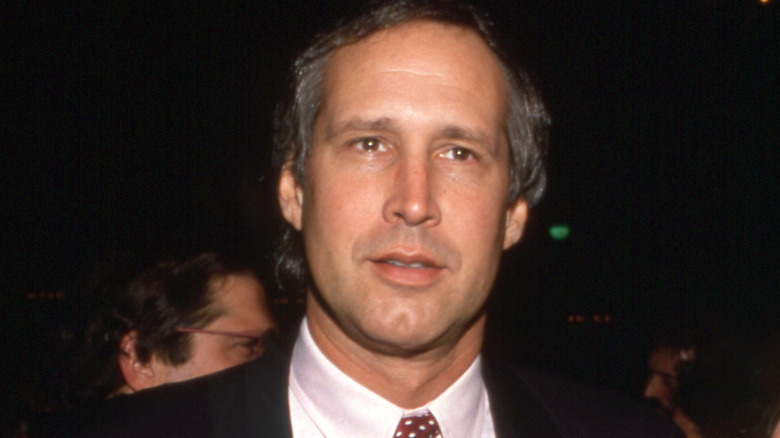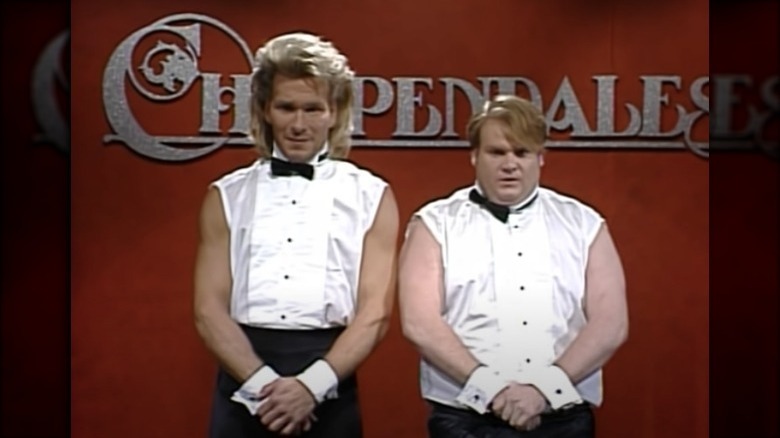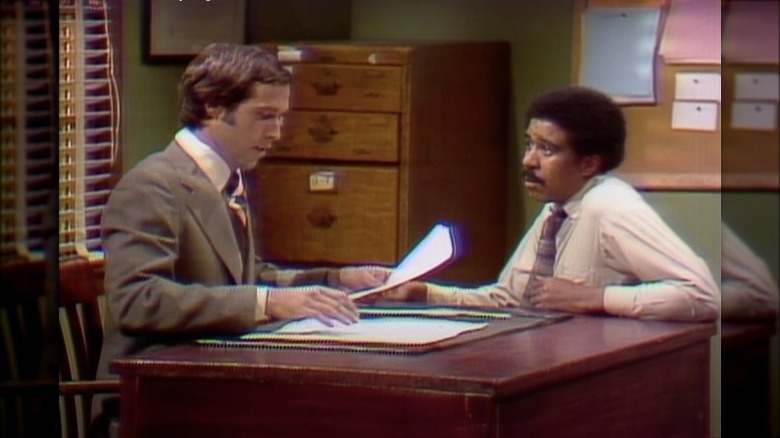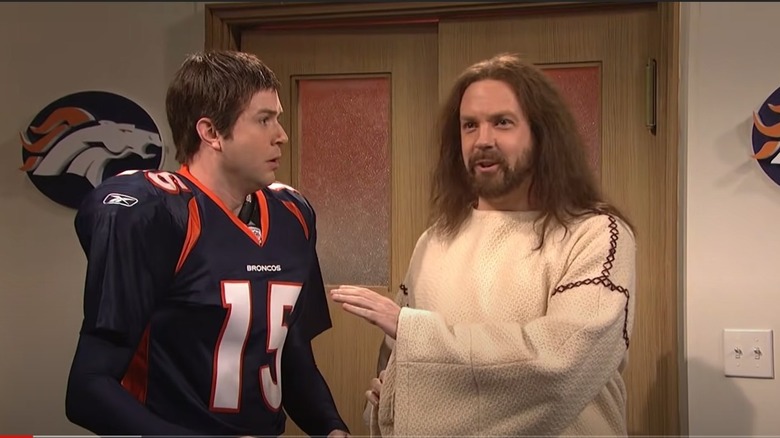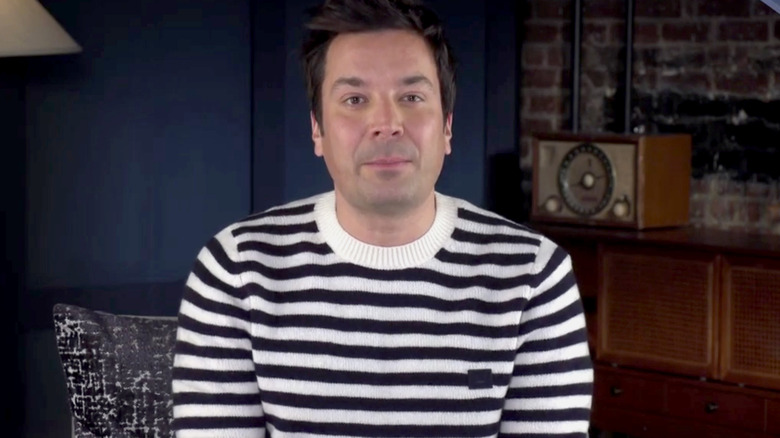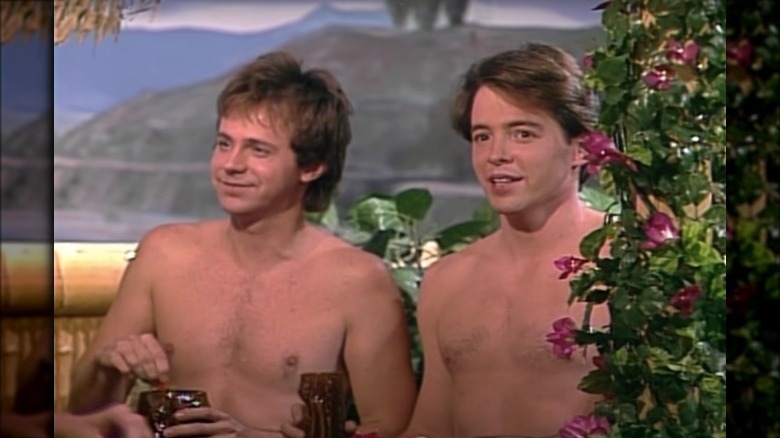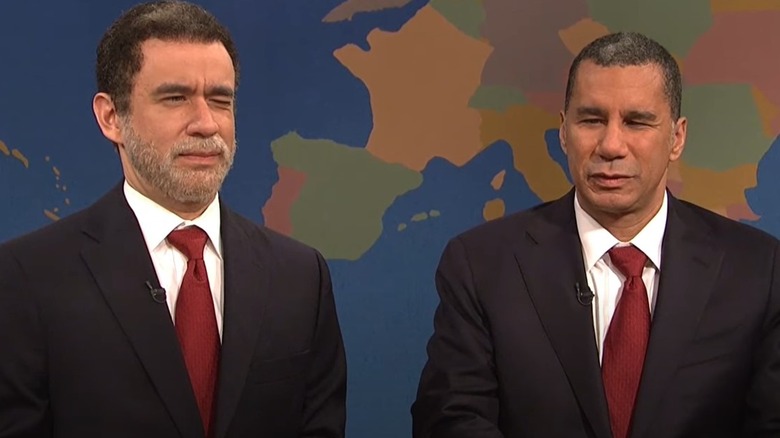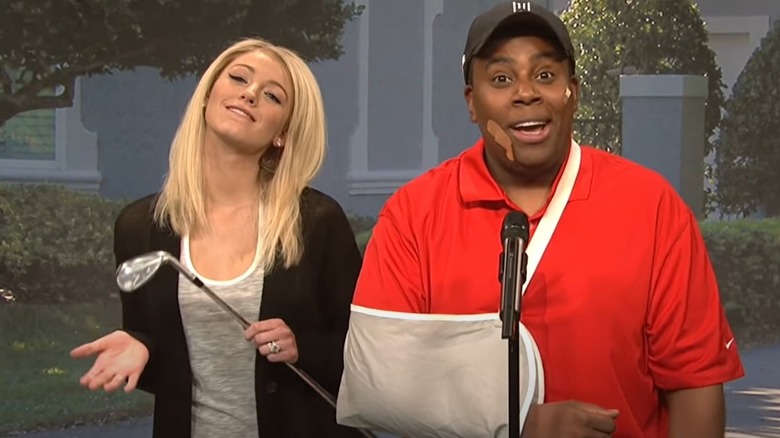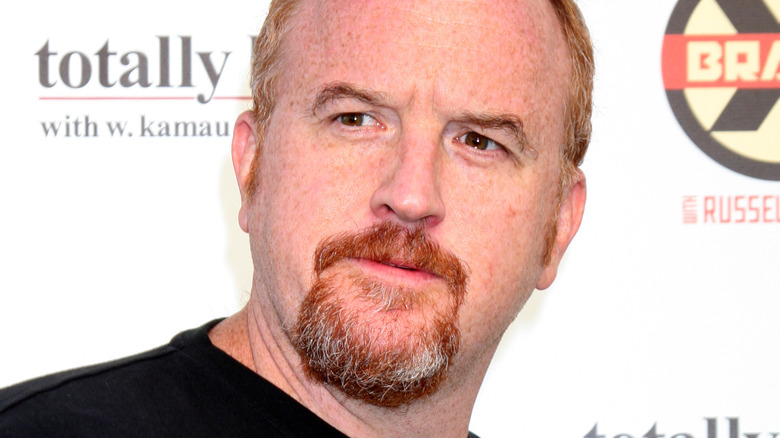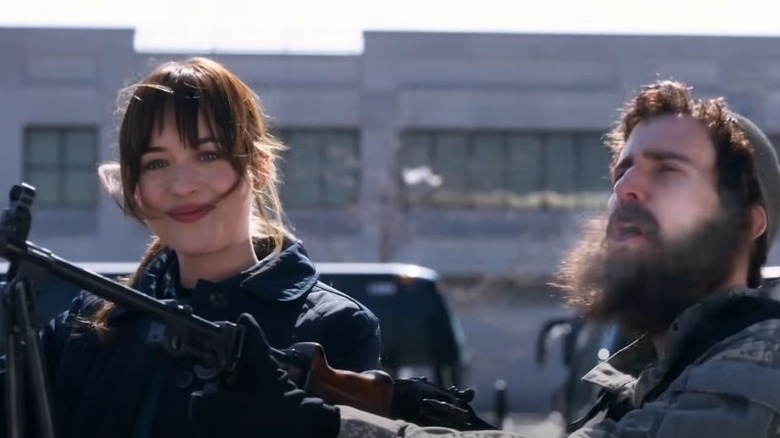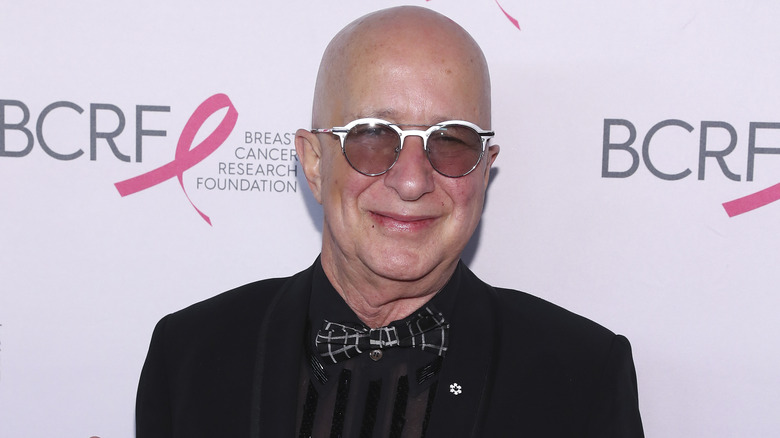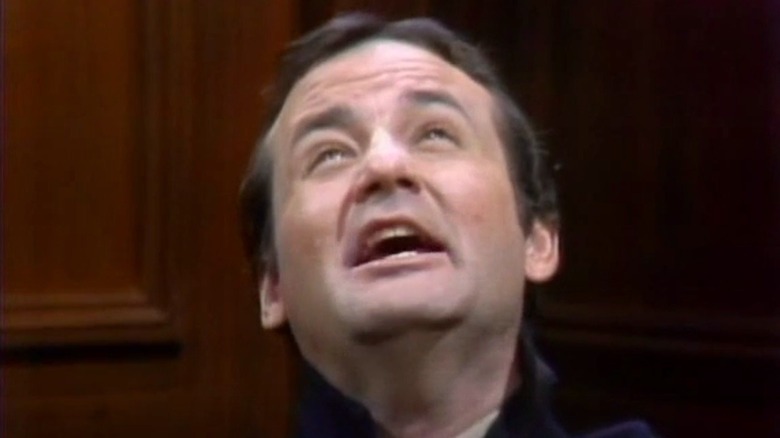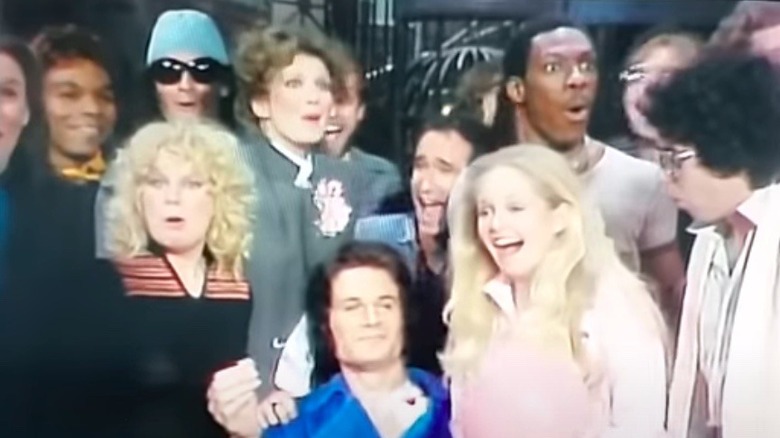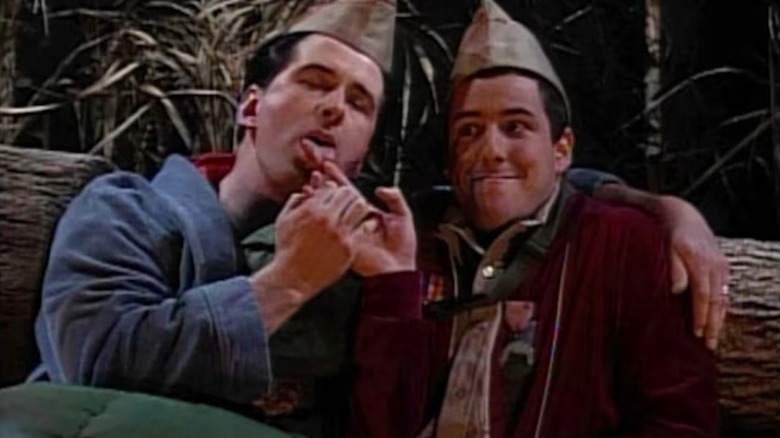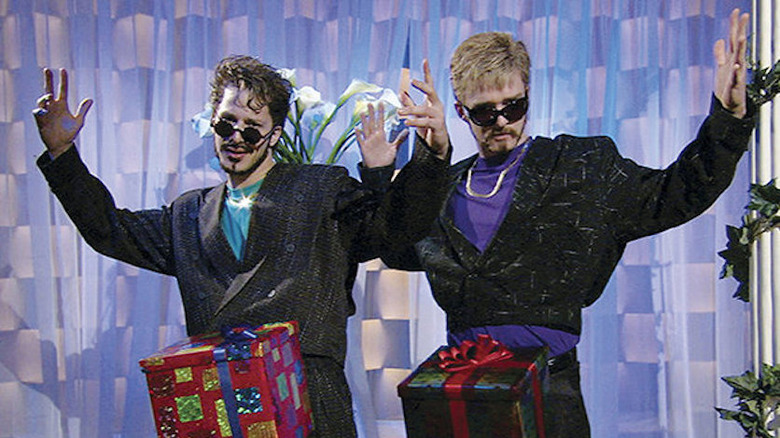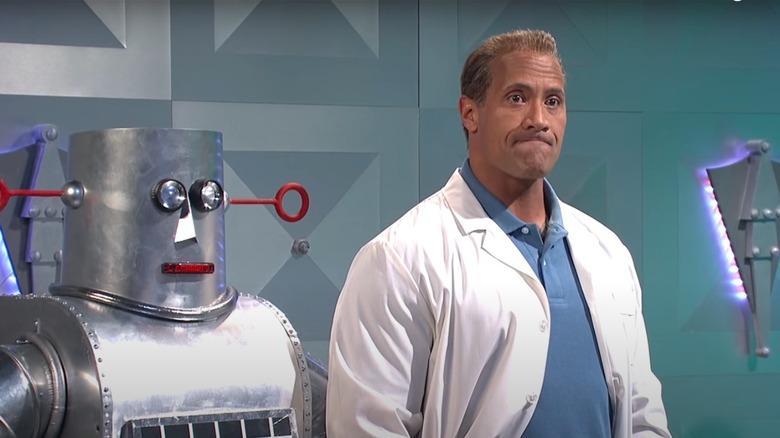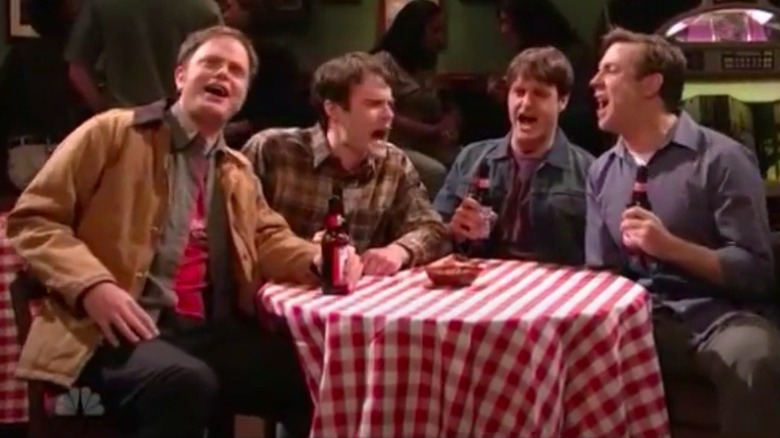The Most Controversial SNL Sketches Ever
The following article includes mention of domestic abuse, child abuse, and sexual assault.
"Saturday Night Live," or "SNL," as it's more commonly called, began in all the way back in 1975. Over the show's decades-long tenure on-air, "SNL" has transformed into more than just a sketch show; the program is one of the biggest institutions in the comedy industry, churning out star after star thanks to its brutal weekly schedule that keeps both writers and performers awake for days at a time in the name of comedy creation.
Most viewers expect a certain level of lewdness from the decades-old comedy program. The show's popularity means that sometimes, sketches are seen by more conservative circles who undoubtedly take offense to inappropriate or blasphemous comedy. Less frequently, however, are the sketches that truly offend — ones that make even the most seasoned comedy fans uncomfortable, leaving some viewers wondering how the skit made it past so many levels of review. Blame it on hypersensitivity, sleep deprivation, or plain bad taste — these are the most controversial sketches in "SNL"'s long history.
The fat-shaming Chippendale's Audition
The 1990 sketch "Chippendale's Audition" is just one of the many moments that has made Chris Farley a household name even decades after his death. Featuring a svelte Patrick Swayze pitted against a heavy-set Farley during an erotic dancer audition, the sketch highlighted Farley's signature physical comedy style. With nearly seven million YouTube views, it's still one of the most popular "SNL" sketches of all time.
While the sketch was popular with audiences, it caused controversy amongst Farley's coworkers at "SNL." In Farley's biography, "The Chris Farley Show," Chris Rock claims he "hated" the sketch, continuing that "a more mentally together Chris Farley wouldn't have done it." Bob Odenkirk wished Farley "never would have done" the sketch, and "couldn't believe anyone liked it enough to put it on the show."
Writer Rober Smigel, however, felt the sketch didn't deserve all the hate — according to Entertainment Weekly, he told Howard Stern that it was "very empowering" for audience members to see Farley "completely proud, just unashamed and going for it." Rock wholeheartedly disagreed. "As funny as that sketch was, and as many accolades as he got for it, it's one of the things that killed him," Rock said. "It really is. Something happened right then."
Chevy Chase and Richard Pryor shock the nation
The "Saturday Night Live" we know today isn't exactly known for its edgy, dark comedy. But this was 1975 when "SNL" was a new kind of sketch program fueled by cocaine and sleep deprivation that pushed the boundaries — for better or worse.
One of the most infamous sketches out of Season 1 was "Word Association," in which Chevy Chase and Richard Pryor toss slurs back-and-forth until Chase eventually blurts out the N-word, much to Pryor's horror. The sketch still both shocks viewers and receives accolades today — Rolling Stone boldly claimed that the sketch was "the last time a white guy said the N-word on TV and actually diffused racial tensions rather than ignited them" — but at the time, the bit was unlike anything ever aired on network television.
The sketch was written by Pryor's writing partner, Paul Mooney. In his memoir, Mooney said the sketch was inspired by his own experience as a Black man being interviewed by white network executives. Mooney called "Word Association" the "easiest sketch" he had ever written, adding, "All I do is bring out what is going on beneath the surface of that interview with Lorne and the NBC execs." Like it or not, "Word Association" has earned its place in television history.
Tebow offends Christians
How do you explain the cultural phenomenon that was Tim Tebow to folks who didn't experience it? "He was good at football, but he was great at praying" seems like a flippant way to describe Tebow's extreme popularity in 2013, which made it the perfect route for "Saturday Night Live" to take when mocking the tight end's showy devotion to the Lord. In "Jesus Visits Tim Tebow and The Denver Broncos," Jason Sudeikis plays a laid-back Jesus Christ who is exhausted with helping the Broncos win game after game — it's interfering with his work attending other events where he's frequently called up, like the Country Music Awards and beauty pageants.
By the end of the sketch, Christ exits with a plea for Tebow to "take it down a notch" with his love of Jesus, a plot point that some Christians did not appreciate. Famous televangelist Pat Robertson (via Entertainment Weekly) claimed the sketch was an example of "anti-Christian bigotry," adding an Islamophobic claim that "if this had been a Muslim country and they had done that, and had Muhammad doing that stuff, you would have found bombs being thrown off and bodies on the street." Mediate writes that Robertson wasn't alone — Fox News' Bob Beckel called the sketch "despicable" for portraying Christianity in a negative light.
Jimmy Fallon's blackface scandal
In 2000, "Saturday Night Live" cast member Jimmy Fallon regrettably donned blackface in an impersonation of Chris Rock. The sketch was largely forgotten for two decades and it didn't exist on "SNL"'s official YouTube account, until a clip resurfaced on X, formerly known as Twitter, resulting in the hashtag #JimmyFallonIsOverParty and a public apology where Fallon admitted that there was "no excuse" for his "terrible decision to do an impersonation of Chris Rock while in blackface." Fallon also spoke with NAACP president Derrick Johnson on "The Tonight Show," where he said he was "horrified and embarrassed" by his past mistakes.
In response to the scandal, Rock told The New York Times, "I'm friends with Jimmy. Jimmy's a great guy. And he didn't mean anything," adding, "A lot of people want to say intention doesn't matter, but it does. And I don't think Jimmy Fallon intended to hurt me. And he didn't." Blackface, though, hurts a lot more people than just the target of the joke.
Just don't talk about genitalia
According to The Economist, the Federal Communications Commission (FCC) determined that "fleeting uses" of words such as "penis" "do not render the material patently offensive under contemporary community standards for the broadcast medium." "Saturday Night Live" took full advantage of that fact in their 1988 "nude beach" sketch, where "penis" is uttered not once, not twice, but 42 times. Can we get a definition of "fleeting?"
The sketch portrays Matthew Broderick attending a nude beach for the first time. He's self-conscious, but no worries — according to his friend, played by Dana Carvey, he's got "nothing to worry about" since "everyone is here just to relax." Of course, Broderick's fears are immediately confirmed when a group of men approach Carvey with a greeting: "Penis looks great today!" The men then turn to Broderick with friendly smiles: "Hey, Doug. Pretty small penis there!" The sketch taps into the self-conscious paranoia we all feel in new situations — and offended plenty of people in the process.
"Nude Beach" was a cultural phenomenon, even making its way into academic books. In "The Domesticated Penis: How Womanhood Has Shaped Manhood," Loretta Comier and Sharon Jones write that the sketch, co-written by Conan O'Brien, "received over 40,000 letters of complaint" in an "enormous" display of "public outrage."
Fred Armisen mocks a blind man
Fred Armisen's "Weekend Update" characters include fan-favorites like "political comedian" Nicholas Fehn and kitschy folk singer Garth. He tends to get away with pretty much anything, but when Armisen tried his hand at mimicking David Paterson, then-governor of New York State, the response wasn't so charitable. Armisen portrayed Paterson, who is blind, as a bumbling man who didn't know where he was on stage and committed gaffes like holding charts upside-down.
Many viewers, including the governor himself, were not impressed with Armisen's mockery of Paterson's disability. According to The New York Times, Paterson's office released a statement saying that the sketch "unfortunately chose to ridicule people with physical disabilities and imply that disabled people are incapable of having jobs with serious responsibilities," adding that while "the governor engages in humor all the time," the sketch was more "offensive" than funny.
The bit came to an end when Paterson himself appeared alongside Armisen on "Weekend Update" to announce that "jokes that degrade people just for their disabilities are sophomoric and stupid," which received a round of applause from the audience. When the cast apologized to him, Paterson responded with the final punch: "You have poked so much fun at me for being blind that I forgot I was Black." Paterson, it seems, took the sketch in stride — and shared some of his own quips in the process.
A Tiger Woods sketch makes light of domestic abuse
In 2009, Tiger Woods made headlines when he crashed his car after his wife, Elin Nordegren, broke his rear windows with a golf club. Woods was the kind of athlete whose superstardom eclipsed the sport of golf; everyone, including folks whose knowledge of the game was limited to putt-putt, could recognize Woods'S face on a box of Wheaties. When news of the accident broke, outlets like The Atlantic quickly speculated that the incident was an act of domestic violence on Nordegren's part after she discovered that Woods was cheating. The incident temporarily ended Woods' career — and inspired a controversial "Saturday Night Live" sketch that made light of domestic violence.
In the sketch, Kenan Thompson plays a bewildered Woods, who is being interviewed with his wife — played by Blake Lively — by Wolf Blitzer. "Wow ... I've been really clumsy this week," says Thompson, who appears in bandages and a sling. Lively appears next to him with a golf club as Thompson's cell phone begins to ring. "Who's that?" asks Lively — and the scene is abruptly cut short before Thompson returns with even more injuries.
Viewers online erupted with criticism, according to The New York Times. The sketch couldn't have had worse timing (if there's ever good timing for jokes about beating your spouse) as it was aired just months after Chris Brown reportedly assaulted Rihanna — who was the musical guest of the night.
Jenny Slate dropped an F-bomb
According to PRX's censorship guide, "obscene content" is not protected by the First Amendment — meaning that use of the F-word on broadcast television is still not completely allowed, even decades after George Carlin illuminated the absurdity of censoring "seven dirty words." Although the FCC's censorship of profanity is loosening, "Saturday Night Live" still refuses to get too profane. In the words of Far Out, "SNL"'s vigilant self-censorship is "the kind of thing that makes 'SNL' legendary and keeps Lorne Michaels' name in the good books of advertisers everywhere."
That means that using that word, that verbal Voldemort so devastating to prudish ears that half the time we only refer to it in euphemism, can get you banned from "SNL" for life. And while Jenny Slate wasn't the first "SNL" cast member to utter the big bad f-bomb, she had the misfortune of slipping into the phrase during her very first sketch on the legendary show.
While Slate's use of the word was a complete accident, viewers still speculated that the incident was the reason she only lasted one season as a cast member. In an interview with InStyle, Slate refuted that claim, saying that profanity was not the reason she was fired from the show. "I didn't do a good job, I didn't click ... All I know is, it didn't work for me, and I got fired."
Louis C.K.'s monologue doesn't exactly land
Now-fallen star Louis C.K. was on top of the world in 2015. Between his popular stand-up specials and hit TV show "Louie," it seemed that the comedian could get away with nearly anything. C.K. was known for twisting absurd and disgusting topics into palatable observations — but this method didn't quite work during C.K.'s "Saturday Night Live" opening monologue.
The comedian took his hosting gig as an opportunity to express his disappointment that the child molester who lived in his childhood neighborhood "didn't like" him. He then quipped that for a pedophile, the horrifying act of molesting a child "must be amazing, for them to risk so much" before acknowledging that his controversial jokes would likely get him banned from the show.
While some people, like radio host Opie Hughes, thought the set was fantastic, most folks weren't so charitable about C.K.'s attempt to humanize sex offenders. The Hollywood Reporter compiled a list of reactions tweeted by viewers — people called the bit "yucky," speculated that people who enjoyed the monologue must be "predators themselves, or victims of sexual abuse," and claimed that it was "the unfunniest, most offensive" opening monologue ever shown on "SNL." The drama surrounding the bit seems even more justified when you consider that just two years later, C.K. was finally exposed to the public as a serial sex offender, a scandal that effectively ended his career.
ISIS doesn't make a great punchline
During the 2015 Super Bowl, Toyota released a tear-jerker of an ad that showed a father dropping his daughter off to join the army. The writing staff at "Saturday Night Live" clearly found the ad ridiculous and wrote a spoof of the spot starring the week's host, Dakota Johnson. In "SNL"'s version of the commercial, Johnson and Taran Killam play a father and daughter sharing an emotional moment outside of an official-looking building. When the time comes for Johnson to leave the car, however, she doesn't walk in to join the army — instead, she jumps into a truck filled with ISIS members. "Take care of her," a teary Killam tells an ISIS member. "Death to America," the militant quietly says back, before speeding off into the distance.
At the time, as reported by ABC News, there were several women from the west who were leaving their home countries to join the terrorist group. The commercial parody took aim at both the women joining ISIS and the overly emotional tone of the original Toyota commercial — but for many folks, the joke just didn't land. The New York Post compiled some of the outrage (and support) expressed on X where viewers called it "the most unfunny" "SNL" sketch ever. "Sorry, but no laughing matter. Ever." said one user. Some people, however, loved the parody — as one tweet said of ISIS, "There's no group more deserving of ridicule."
Djesus Uncrossed offends basically everybody
"Saturday Night Live" is known for its parody trailers of box office hits, and the popular film "Django Unchained" was no exception. The sketch, titled "Djesus Uncrossed," portrayed the prince of peace taking his revenge on the Roman officials that had him crucified in a dramatic, action-filled trailer that featured swords, guns, and lots of blood. He's not exactly the Jesus you may have learned about in Sunday school.
Predictably, the sketch enraged some conservative Christians. One think piece posted on Before It's News exclaimed "This pretend movie trailer is not in the least way funny. It is, frankly, sick. It is pure adulterated blasphemy of Jesus Christ, the Son of God and the Savior of mankind," continuing to give NBC the moniker of the "Nothing But Corruption network." More surprising, though, was that the sketch also angered the Council on American-Islamic Relations — according to The Atlantic, the Council called the sketch "extremely offensive to Muslims and to all those who believe in his message," continuing to say that "such a distasteful portrayal of a religious figure revered by billions of Muslims and Christians worldwide crosses the comedic line." The folks at "SNL" likely expected the backlash — after all, what else can you expect when you're Tarantino-ing the Bible?
Paul Shaffer accidentally went off the 'flogging' script
One of the most controversial sketches in the early days of "Saturday Night Live" is also among its least-remembered — even though it represented a very notorious first for the show. In the 1980 sketch, Bill Murray, Harry Shearer, and Paul Shaffer (then a member of the "SNL" band, before going on to become bandleader on "The Late Show with David Letterman") played members of a medieval musical group. The sketch parodied the infamous "Troggs Tapes," a leaked recording of the British rockers, The Troggs, hilariously arguing in the studio as the F-bombs fly.
For the "SNL" takeoff, the word "flogging" was used as a replacement for the expletive heard ad nauseum throughout the tape. The sketch went as planned until Shaffer made a verbal stumble and accidentally uttered the actual word, marking the first time the F-word had ever been used on "SNL."
Shaffer addressed that "SNL" notoriety in his 2010 memoir, "We'll Be Here For the Rest of Our Lives." "It went really well in the dress rehearsal," Shaffer recalled of the sketch, as excerpted by Entertainment Weekly. "So well that I added extra 'flogging's until there was finally just a total slip. I went white. When it was over, Lorne Michaels came up and said, 'You broke down the last barrier.'" And while that may have been the first time that particular barrier was broken on the show, it was also far from the last.
Buck Henry's creepy 'Uncle Roy' sketches
Buck Henry was a frequent "Saturday Night Live" host during the show's original iteration, hosting 10 times between 1975 and 1980. Among the various characters he played was Uncle Roy, a pervy babysitter who takes inappropriate Polaroids of two young girls, played by Laraine Newman and Gilda Radner. Pedophilia isn't typically a source of laughter, and the sketches' writers — Anne Beatts and Rosie Shuster — realized they were walking a fine line.
"It was the lighter side of child molestation, I guess," Beatts told Vice of those sketches. "But the idea of — what was funny to us, first off all, was that the parents [in the sketch] were so clueless. They were just like, 'Oh Roy, you're too good!' Then the other thing was that the girls were innocent, and they just always triumphed over him, they turned the tables on him as a sexual predator, in a way. It pushed the envelope a little."
Interviewed by the Television Academy Foundation, Henry explained how he was able to reconcile playing such a creepy character. He recalled one sketch, in which the kids' mother tells him, "It's a shame every family can't have an Uncle Roy." His character responds, "Oh, there's more of me than you might suspect!" Henry explained that he thought the sketch would bring awareness: "I thought this is a great moment in which, possibly, I can start interesting conversations in families across America about who was the Uncle Roy in their family."
'First He Cries'
"First, You Cry," was a made-for-TV movie — based on Betty Rollin's memoir — starring Mary Tyler Moore as a woman whose mastectomy after a breast cancer diagnosis impacted her marriage. "Saturday Night Live" spoofed the movie with the parody, "First He Cries," which added a misogyny-mocking spin by focusing on the trauma experienced by the woman's selfish, breast-obsessed husband, played by Bill Murray. "I notice it's my wife that's getting all the medicine and all the physical therapy," Murray's character whined. "What about ME?!!"
While the point of the sketch — written by Al Franken and Tom Davis — was clearly to mock the husband's insensitivity, there was no denying just how edgy it was. NBC censors were on the fence but ultimately gave their approval. Even Murray recognized how much controversy the sketch could generate. "Do you know what it's like to go out there and play something that's going to make people hate you?" he complained to one of the show's writers, as detailed in "Saturday Night: A Backstage History of Saturday Night Live."
As predicted, "First He Cries" resulted in a tsunami of angry phone calls; 160 generated from just New York City on the evening of the broadcast, and another 75 the following day, along with 300 complaint letters sent via mail. However, one viewer who loved the sketch was Rollin herself, who wrote a letter detailing how much she enjoyed it. "I wasn't the slightest bit offended," she wrote. "I thought the premise of the sketch was terrific."
Charles Rocket's infamous F-bomb
During the notoriously terrible 1980-1981 season of "Saturday Night Live" — the first season after the original cast and series creator Lorne Michaels had left — a whole new group of comedians were hired for the sketch show, including Charles Rocket. In one infamous episode, hosted by "Dallas" star Charlene Tilton, Rocket played the "Dallas" villain, J.R. Ewing, in a sketch spoofing the now-classic "Who shot J.R.?" storyline from the soap opera. During the closing segment, in which the host and cast said their goodnights, Tilton asked Rocket how it felt to be shot. Rocket replied, "It's the first time I've been shot in my life. I'd like to know who the f*** did it."
While Rocket's co-stars reacted with laughter and visible surprise, the shockwaves from the stray F-bomb reverberated long after the credits rolled. According to Fred Silverman, who was then NBC's president, "SNL" had become a disaster ever since new producer Jean Doumanian took over for Michaels. Rocket's slip became an excuse to fire Doumanian and overhaul the cast by sacking many of them, including Rocket. "And that was it," Silverman said in the book "Live from New York." "I said, 'Who needs this aggravation?' I think we'd made the decision even before then that we had to get rid of her. This woman was a train wreck, and the shows were just not watchable."
Dana Carvey's cringe-worthy impression of a Chinese shopkeeper
Dana Carvey was an MVP during his seasons on "Saturday Night Live," known for his iconoclastic impressions of public figures ranging from George H.W. Bush to John Travolta. Of all the numerous characters he played, one from 1987 really pushed the boundaries in a series of recurring sketches about an Asian shopkeeper who sold live chickens as pets.
The impression can charitably be described as wildly racist, while the character's name — Ching Chang — isn't exactly what one would claim to be culturally sensitive. In addition to the character's broken English, Carvey's impression was accompanied by an array of stereotypes, including a bowl-cut hairstyle, a shirt buttoned up to the top button with pants pulled up high, and glasses with ridiculously thick lenses.
While the sketch has understandably aged horribly, it did not escape criticism at the time. "The result of the skit's premise was to perpetuate base racial divisions," noted the Harvard Crimson in its 1988 critique. Carvey's impression was resurrected as an example in 2019 when comedian Shane Gillis, who had recently been hired by "SNL," was let go when racist comments about Asians he had made in a podcast resurfaced. One social media user pointed out the hypocrisy by tweeting, "Glad 'SNL' is cutting ties with the racist guy. Now to revisit some of my favorite sketches," accompanied by a photo of Carvey in character as Ching Chang.
Alec Baldwin's lusty scoutmaster
Alec Baldwin has been associated with "Saturday Night Live" for decades, hosting numerous times and appearing in countless sketches over the years. In 1994, however, one of these generated significant controversy when Baldwin played a scoutmaster putting the moves on Canteen Boy, the bizarre creation of Adam Sandler. In the sketch, Canteen Boy's naivete is on full display when Baldwin's character snuggles up to him, eventually removing his shirt and licking Sandler's fingers.
While the age of Canteen Boy was never specifically denoted, viewers who had assumed Sandler's character was under 18 were perturbed by the implication of an adult male seducing a minor. As The Washington Post recalled, Chicago Sun-Times columnist Richard Roeper referenced receiving calls from viewers who had shared their disgust with the sketch.
Baldwin made a second appearance as host that season, and confronted the Canteen Boy controversy in his opening monologue. "Now, even though the character of Canteen Boy is a grown man, a perfectly intelligent 27-year old — not a child — some people got the wrong idea, and, frankly, all hell broke loose," Baldwin said. "The NBC switchboard handled over 300,000 angry phone calls that night alone, and the network lost seven affiliates as a result of the sketch," he continued, clearly exaggerating the extent of the complaints. "Sinead O'Conner ripped up a picture of Canteen Boy to deafening cheers at London's Wembley Stadium," he added, "And Soldier Of Fortune magazine reported a 25 percent drop in the sale of canteens."
Bleeps in a box
One of the most enduringly popular "Saturday Night Live" sketches is "D*** in a Box," which first aired during the 2006 holiday episode. Featuring Justin Timberlake and Andy Samberg, the faux music video showed two guys with immaculately trimmed facial hair who offer the perfect Christmas gift for the respective women in their lives: their own private area, presented within a gift-wrapped box.
While "D*** in a Box" continued to appear in the annual "SNL" holiday specials, it was touch and go whether NBC censors would even let the sketch appear on television. During an interview with Hot Ones, Timberlake revealed that, after some negotiation, the FCC agreed it could air, but only if the sketch's central word — used 16 times — was bleeped. "The irony of that is I think the funnier version is the bleeped-out version," Timberlake said.
While the joke song was popular with viewers, that was not the case with Brent Bozell. The perpetually outraged head of the Parents Television Council wasn't happy the uncensored version could be seen online. "This is a new low for NBC," Bozell griped in a statement. "Clearly, the network will stop at nothing to find loopholes for its indecent programming to reach the public."
The Rock went overboard on evil
Dwayne "The Rock" Johnson has proven to be a solid "Saturday Night Live" host over the years, demonstrating an easygoing gameness to appear in edgy sketches that push the envelope. Arguably the most controversial of these was 2017's "World's Most Evil Invention," which focuses on the Mad Scientists Society handing out an award honoring the single member of the group who has created an invention more evil than any other. After the first two scientists pitch their inventions — one a ray gun that shrinks stuff, another that freezes things — it's Johnson's turn.
"Hi guys, my name is Roy," his character declares while wheeling out a primitive robot. "And for the most evil invention in the world contest, I invented a child-molesting robot." The other mad scientists are understandably appalled, especially when Roy proudly boasts that his robot has the capability to harm substantially more kids than any human ever could. Then, the other mad scientists become even more creeped out when Roy explains how his invention came into being. "What you do is you start by building a regular robot," he tells the others. "Then you molest it and hope that it continues the cycle."
Some viewers were as appalled as the sketch's audience of scientists. "Who seriously thought this child molester robot sketch was IN ANY WAY FUNNY?!?!" read one tweet. Another tweet complained, "Harming children isn't funny. 'SNL' crossed the line here."
Mocking people with Down syndrome went too far
"The Office" star Rainn Wilson hosted "Saturday Night Live" in 2007, and appeared in a sketch called "Danny's Song." In the bit, Wilson is joined by "SNL" cast members Bill Hader, Will Forte, and Jason Sudeikis, with the four playing buddies drinking beer in a bar while reminiscing about the good ol' days as a song on the jukebox dredges up memories.
At one point, Hader's character explains that the song playing — Loggins and Messina's "Danny's Song" — reminds him of his father. "He loved this song," the character said, recalling a memorable day in the park when his dad chased squirrels, and the two spent hours throwing pennies into a fountain. "It was so great," he gushed. "It was the first day I ever thought to myself, just, 'I have a dad,' and not, 'I have a dad with Down syndrome.'"
That particular line proved to be a particularly controversial one, earning a stern rebuke from Jon Colman and Pam van der Lee, the CEO and chair, respectively, of the National Down Syndrome Society. "Individuals with Down syndrome and other intellectual disabilities work very hard — harder than most people — to learn how to read, write, play musical instruments, participate in sports, live independently, and become valuable members of their communities," they wrote in a statement (via CheatSheet). "They deserve to be respected and celebrated for their success and achievements, and not to have their clinical diagnosis used as a punchline."
A commercial parody was unnecessarily racist
A 2013 "Saturday Night Live" commercial parody advertised Starbucks' new Verismo, a machine that could replicate the java served at the famed coffee chain. To enhance the experience, the Verismo offers a voice feature that lets users know when the coffee is ready.
Naturally, the machine serves tea instead of the requested latte and gets the woman's name — Marcia — completely wrong, with "Amorfa" written on the mug. Accompanying the Verismo is the Verquonica, a gadget boasting garish earrings that is described as "a larger non-functional machine for Verismo to talk to about you." The two devices begin trash-talking the woman behind her back, even though she can hear everything they're saying about her, mimicking the experience of getting attitude from actual Starbucks staffers.
While the sketch depicted people who work at Starbucks as incompetent and not too bright, what pushed it into controversial territory were the voices used for the machines, which were clearly meant to be Black. That seemingly racist element did not go unnoticed. Simon Dumenco, writing for Ad Age, found the sketch funny — at first. "That said, I cringed a bit at the voice characterization of the home-brewing machine," he wrote. "But then when the Verquonica system was introduced a minute and 15 seconds in, I ... really took pause." Meanwhile, Gothamist's Christopher Robbins wrote, "We have no experience writing comedy, but it seems that executing this skit without the racist machine voices would be easy enough."
If you or someone you know is dealing with domestic abuse, may be the victim of child abuse, or has been a victim of sexual assault, contact the relevant resources below:
- Call the National Domestic Violence Hotline at 1−800−799−7233. You can also find more information, resources, and support at their website.
- Contact the Childhelp National Child Abuse Hotline at 1-800-4-A-Child (1-800-422-4453) or contact their live chat services.
- Visit the Rape, Abuse & Incest National Network website or contact RAINN's National Helpline at 1-800-656-HOPE (4673).

